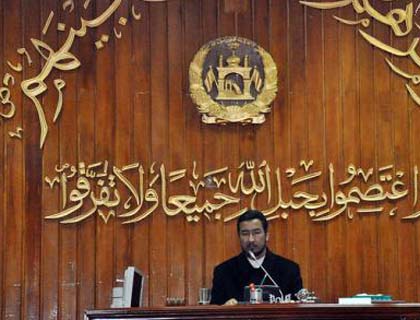KABUL - As debate around the MPs' tenure in Parliament rages, a number of Wolesi Jirga (Lower House of Parliament) members on Wednesday stated that Parliament's continuation after the end of its term is legal until the holding of the next parliamentary election.
Following strong opposition by some lawmakers who believe the continuation of work by MPs after June 21 will be illegal, Wolesi Jirga Speaker Abdul Raouf Ibrahimi said in Wednesday's session that any personal comment on Parliament's term was meaningless.
"We have gotten our legitimacy from the people," Ibrahimi told lawmakers. "We will continue our work until the next elections."
This comes amid rising concerns, as in the absence of parliamentary elections, there is less than two weeks left in the current Parliament's term.
Speculation however is rife among political figures and government officials of whom many suggest elections will likely be delayed for a year.
"If the election is delayed for 40 years, our work will still be legal," MP Rahman Rahmani said.
But 18 laws and international agreements still await approval by the lawmakers, including among others, the law prohibiting violence against women.
But some lawmakers vehemently oppose the continuation of Parliament after the term ends. This includes MP Ramazan Bashardost who told Wednesday's session that: "People say MPs traded with the government leaders on extending the Parliament term in exchange for collecting votes in their favor in the second round of presidential elections."
Afghan law experts meanwhile have warned that based on the Afghan Constitution, representatives in Parliament lose their mandate after June 21, at which point a set of representatives should be elected.
However, with no parliamentary election scheduled and electoral reforms still delayed, it is clear there will be no replacements ready by the end of the month.
One of the key points of agreement between President Ashraf Ghani and CEO Abdullah Abdullah to form the National Unity Government was to reform the country's electoral system ahead of parliamentary elections.
But the election monitoring groups have expressing doubt about government's will to bring reforms to the country's weak election system.
"The NUG leaders do not have the will and commitment to bring electoral reforms," FEFA head Mohammad Yousof Rashid told TOLOnews.
"This is a blow to democracy, it challenges the rule of law and discredits the government and people will lose trust in the government." (Tolonews)

